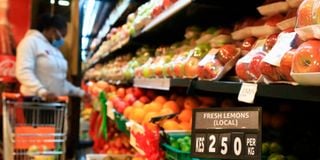Premium
Inflation hits five-year high of 8.5pc on food, fuel price spike

A customer picks fruits at a supermarket in Nyeri. Inflation hit 8.5 per cent in August driven by a sharp increase in the cost of food adding pressure to the high cost of living on households.
What you need to know:
- It is the highest inflation rate in five years driven mainly by a sharp rise in the prices of food, fuel and cooking oil over the past 12 months.
- The price of a kilogram of maize flour went up 4.7 per cent in August from July despite a month-long maize flour subsidy programme.
- Sugar prices have also risen by 4.6 per cent for a 1kg packet over the past month.
Inflation hit 8.5 per cent in August driven by a sharp increase in the cost of food adding pressure to the high cost of living on households in new statistics released by the Kenya National Bureau of Statistics (KNBS).
It is the highest inflation rate in five years driven mainly by a sharp rise in the prices of food, fuel and cooking oil over the past 12 months.
The year-on-year cost of food commodities has gone up 15.3 per cent between August last year and this year as the prices of staple food items such as maize flour went up due to low local production and lower imports amid global supply chain disruptions.
The price of a kilogram of maize flour went up 4.7 per cent in August from July despite a four-week long maize flour subsidy programme by the government that was meant to lower prices to Sh100 per 2kg packet.
Meanwhile, sugar prices have also risen by 4.6 per cent for a 1kg packet over the past month.
Those of non-aromatic rice went up 2.9 per cent for a 2kg packet over the one-month period and 16.5 per cent during the last 12 months.
“Overall year-on-year (annual) inflation rate as measured by the Consumer Price Index (CPI) was 8.5 per cent, in August 2022; an increase from an inflation rate of 8.3 per cent recorded in July 2022. The monthly inflation rate for August 2022 was 0.4 per cent,” said KNBS.
Government subsidies
While government subsidies have kept fuel prices stable for the three months, the cost of petrol and diesel has gone up by 25 per cent and 29.8 per cent respectively over the past year, while that of kerosene, which is used for cooking by low-income households, has increased by 30.5 per cent.
High inflation has forced the government to resort to subsidising the cost of basic commodities such as maize flour, fuel and electricity to ease the pressure of the cost of living on consumers.
The government spent Sh4 billion between July and August on a maize flour subsidy to cut the prices of the product by more than half.
The programme was inked in July between the government and millers to reduce maize flour prices to Sh100 per 2kg packet down from Sh205.
The government is also in a subsidy plan with Kenya Power which has allowed electricity prices to remain stable since January despite high fuel prices.
Kenya still generates about 7 per cent of its electricity from thermal sources, with higher fuel prices leading to a direct increase in electricity prices.
The inflationary pressures of the past year saw the State spend a total of Sh80.67 billion on subsidies for the financial year 2021/22, which is 28 times the Sh2.87 billion it had budgeted to spend on the same during the year.





